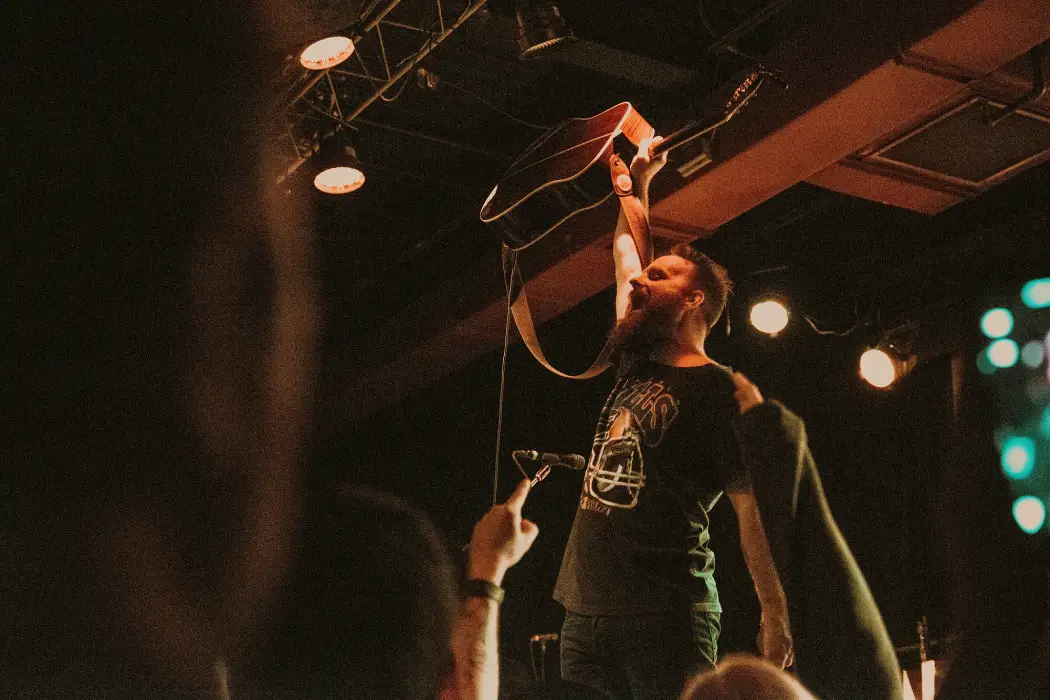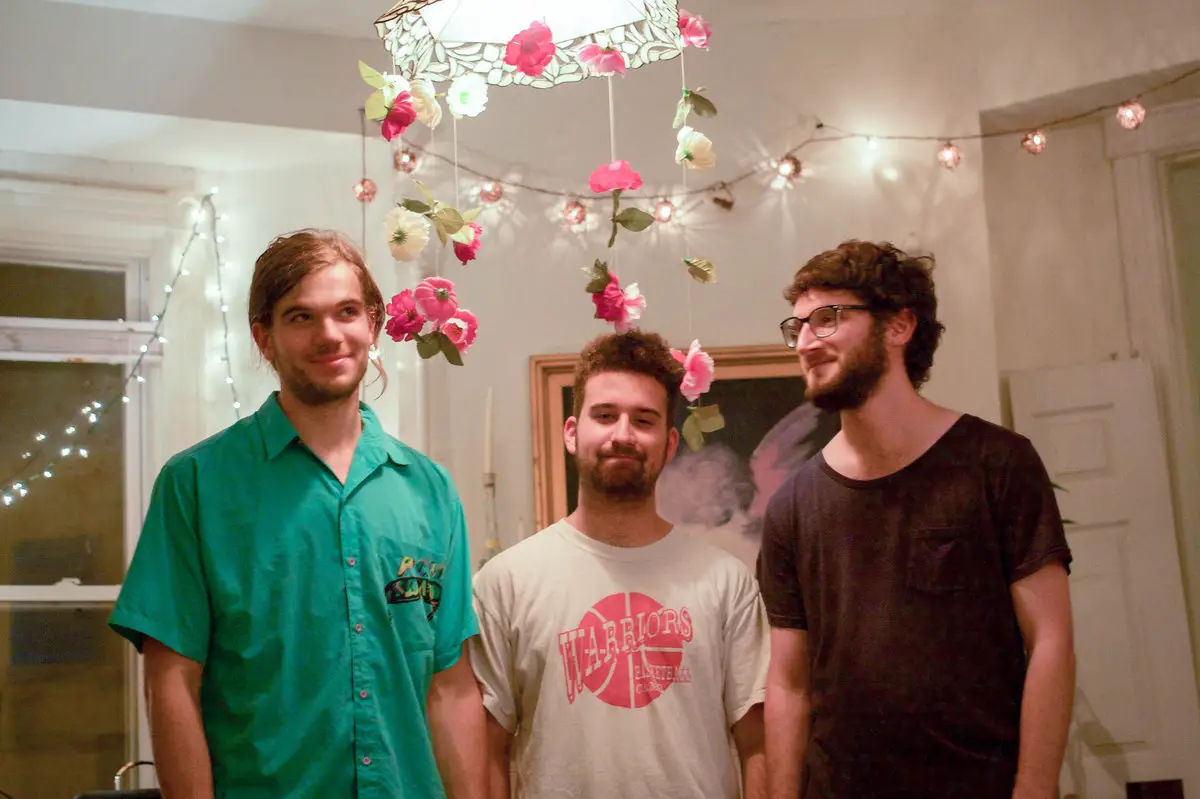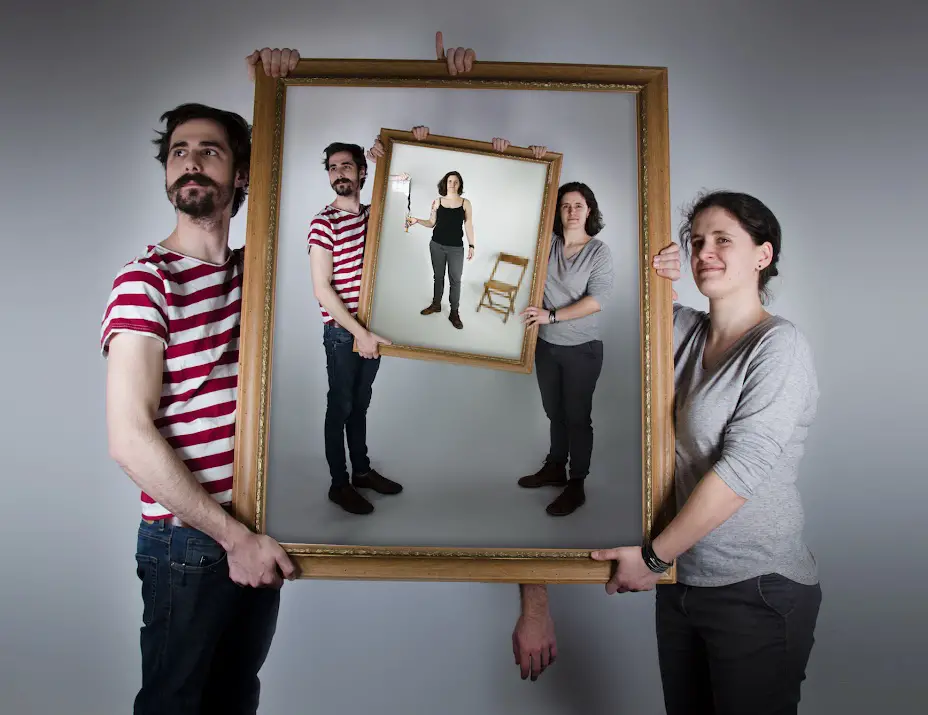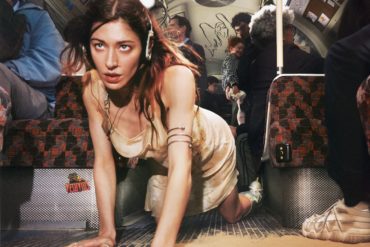Dan Campbell of The Wonder Years discusses his second full-length installment in the Aaron West and The Roaring Twenties saga, ‘Routine Maintenance’.
‘Routine Maintenance’ – Aaron West and The Roaring Twenties
After the car’s sold, apartment sublet, wide receiver traded, ashes scattered, and divorce finalized, what do you do? Aaron West is trying to answer this throughout Routine Maintenance, and while he may not have it all figured out, he’s doing a lot better than where 2014’s debut album We Don’t Have Each Other left off. Routine Maintenance tells the story of West’s journeys across the country, while trying to find comfort and growth.
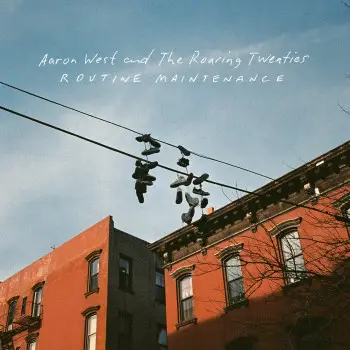
Aaron West and The Roaring Twenties is the solo effort of Wonder Years lead vocalist Dan Campbell. Where his first record with the project took more of a singer/songwriter approach, Routine Maintenance is a full-blown Americana-inspired rock record. Campbell channels Springsteen in both the anthemic style and the bad luck/hopeful nature of his stories. This record serves to offer closure on Aaron West’s marriage, the formation of The Roaring Twenties, and how West went from New Jersey to LA, and back to Long Island.
Dan Campbell spoke to Atwood Magazine about exploring cities in song, performing at open mics, and where he took Aaron West on Routine Maintenance.
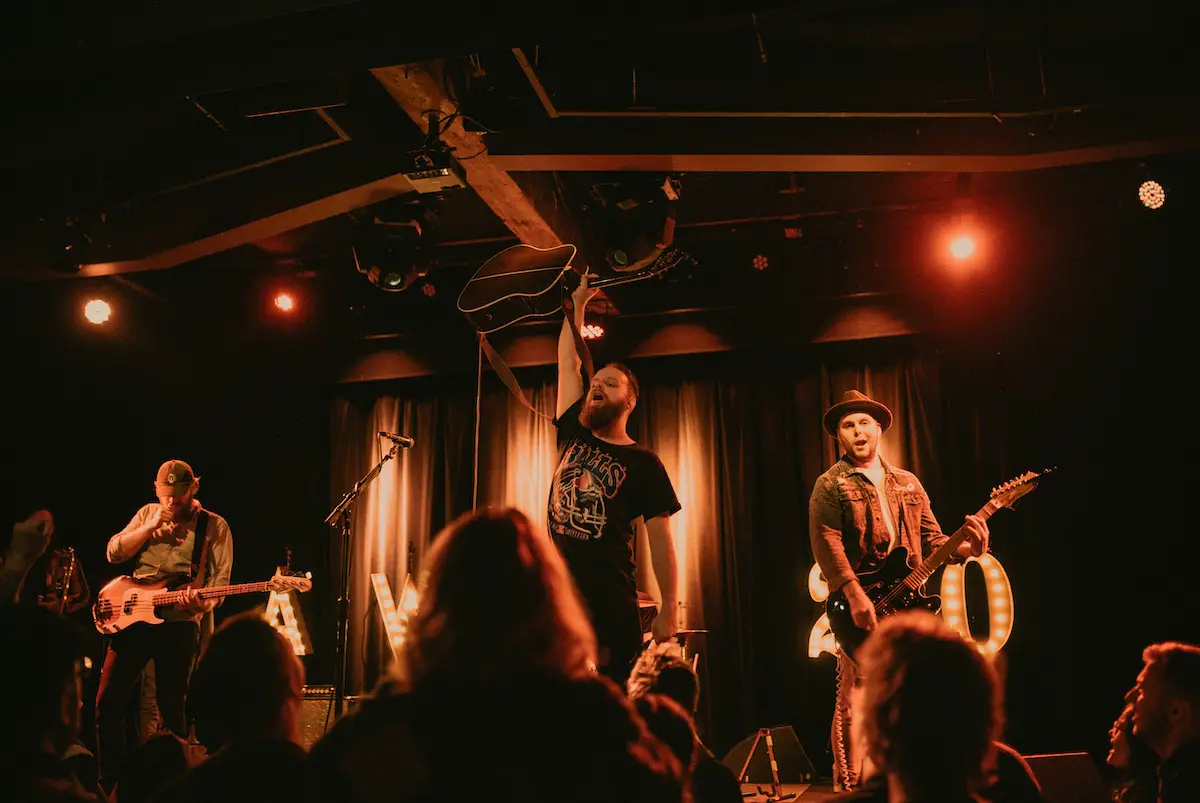
A CONVERSATION WITH DAN CAMPBELL
Atwood Magazine: This is the second Aaron West full-length. You mentioned when We Don't Have Each Other was coming out that it was an experiment and writing exercise to help you grow as a songwriter. Since that was so successful, did that raise the stakes when you were writing Routine Maintenance?
Dan Campbell: Yes, but not to the degree that it has with my other project. The pressure of Wonder Years stuff really is on. Every record with The Wonder Years has outsold the last one. There’s a lot of pressure. With We Don’t Have Each Other, there was none at all. I could do anything I wanted. This splits the difference. I don’t feel this immense pressure to deliver something earth-shattering. I can just deliver something that I believe to be valuable and worthwhile. My personal take is: this is one of my favorite records that I’ve ever been a part of making. I didn’t feel a crushing weight on my chest, which I think helped make it one of my favorite records I’ve ever been a part of making.
Since you mentioned The Wonder Years: The song “God & the Billboards” features the line “Do you think that God reads the billboards,” which is listed in the Sister Cities book as an alternate album title. Even though the projects are separate, is there a little more crossover in them both now?
Campbell: No. I found that out two nights ago. I have this incredibly, unnecessarily, obsessive-compulsive leaning Wonder Years record collection. There are 129 variants of Wonder Years records that I recognize. I have 127 of them right now. I was going back through and organizing all of them and labeling them and putting them in fire-safe boxes, and I opened up the Sister Cities book and scrolled through and remembered that that ended up being a line. What had happened was: I have a notebook on my phone in my notes app. I have one that is just single lines that I think are interesting. I consider “Alternate Titles to the Record” to be a poem. All those things, to me, are poems. It’s not seriously alternate titles for the record. It is a little bit of poetry. When I was writing [the poem], I remember thinking, “This needs one more.” I went back to that notes app and thought, “Oh this would be nice!” and I added it to it. It’s not actually an alternate title for Sister Cities. It’s just a line that I’d written that I thought was nice. I revisited that app when I was starting to look for ideas to finish the Aaron West record.
Stylistically, Routine Maintenance is a little bit more well-orchestrated than the past few releases. Were you a little bit more ambitious by upping the horn sections and things with this record?
Campbell: Yeah, there was a piece of me that said, “Let’s just go all out with that stuff.” To me, it’s some of the most fun stuff I get to do with this project; I have sole-range of picking everything. If I say I want a sax solo on a song, there’ll be a sax solo on the song. I don’t have to convince anyone. With Wonder Years writing, the songs are so dense already, because there are three guys playing guitar or two guys playing guitar and one guy playing keyboards or two guys playing guitar and one guy playing bells. There are so many members of the band. We pile all this sound up, and I think it’s part of what makes The Wonder Years sound what it is. It kind of pulverizes you with this wall of different sounds. In Aaron West, I don’t have any set thing that I have to do. It’s not like, “Well these guys are in the band so they have to play these instruments.” I could always say, “I want a cello on this song,” and we go find a cellist, and they deliver. There’s a little bit more free-reign to it, which is fun.
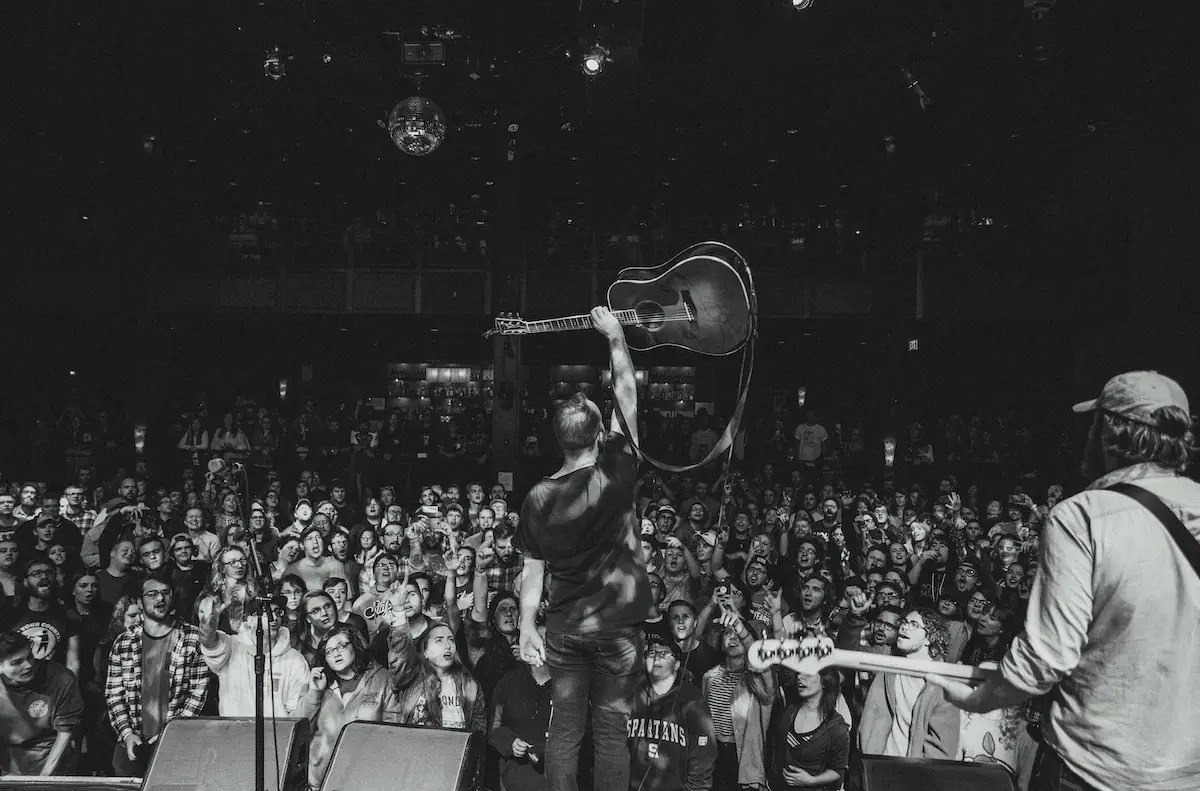
There's a gap from where we last left Aaron and where we find him now, in Asbury Park. As a storyteller, do you know all the details of what's happened with Aaron between “Orchard Park” and “Lead Paint & Salt Air?”
Campbell: Yeah, there’s only about two months or six weeks of gap there. Nothing super dramatic-to me what happened was Aaron’s mom got a little tired of him just sleeping on the couch, and Aaron got a little tired of just sleeping on his mom’s couch and thought, “Let’s get a fresh start somewhere else.” So, he moved to another town and got a job. For him, [it’s] a little bit of a place to reset.
As a writer, is it interesting to get to explore different places?
Campbell: It definitely is. It’s fun for me to research them a little bit. For Asbury Park, that’s a town I’ve been to a lot and have spent a decent amount of time in, so a lot of that comes firsthand. For “Rosa & Reseda,” I’ve been to Reseda a couple of times, so I’m somewhat familiar with it, but I was able to interview one of my friends that lives there, get their perspective, and then weave that into the narrative.
The first four tracks on the record mirror We Don't Have Each Other, where the first track sets the scene, the second track is about Diane leaving, the third track is someone telling him to get out of town, and the fourth track is how Aaron's leaving town. Was it a conscious choice to mirror that to start off the album?
Campbell: I consider it to be semi-conscious, because I didn’t want the arc to mirror it. On the first album, what we’re getting is him dealing with things in an unhealthy way. I wanted this record to be him attempting to deal with them in a healthier way and starting to progress. What I think you see is someone that’s another year older and wiser and maybe another year more thoughtful, going through the same motions. It wasn’t necessarily the intention to line it up song-to-song. That’s a little bit of a by-product of how record pacing works.
“Rosa & Reseda” is my favorite track on the album. Can you tell me a little bit about the writing of it?
Campbell: Yeah, “Rosa and Reseda” is kind of a turning point for the record in a couple ways. It’s the first time in a long time that you see Aaron having a healthy friendship/relationship with someone-people taking care of one another, because it’s important to take care of one another. You see him trusting people and being trusted and genuinely caring for people. I also think it’s an interesting part of the story arc, because it is the spot in which the story accelerates the timeline. We go from one song every month or one song every six weeks, at the top of this record, to being one song for a year for a while, which was super-necessary to make the story arc fit the timeline.
That’s why you also see him growing as a person more rapidly. Before, you see his growth every couple of weeks. Now, you’re seeing his growth over a full year of time.
You debuted “Bloodied Up in a Bar Fight” at an open mic recently, and open mics come up a few times throughout the album. What was it like performing at an open mic where you're already a successful singer? Had you done open mics in the past?
Campbell: I had not done an open mic. My dad used to do some, which is cool. He would never tell us about it, and one day, we went someplace, and everyone knew him. I was like, “What’s going on?” He was like, “Oh yeah, I come here during the day and do open mics.”
It was fun to do, because it was both things colliding. For half of the room, I am some guy named Aaron West that signed up on the board and walked up there with my acoustic guitar and played songs for them like anyone else would play songs for them. That was really fun, because they were treating me like any other performer, which is to say, “Hey, make sure you tune your guitar before you start.” [I said,] “Okay, I’ll do that.” I got an introduction from the host for the evening, and said, “All the way from New York City, it’s Aaron West,” and I got to go up and play the songs, which is fun.
I had this great-There was a couple right in front of me, who definitely go to this open mic every week, or at least, a couple of times a month and had no clue who I was. To them, I am a sign up on a sheet, and they loudly talked over me, about me, six feet in front of my face, but they were saying nice things, which was great. The woman was like, “He’s got a really good voice,” and the guy was like, “Yeah, he does. He should come back. Do you think he’s gonna do any covers?” It was amazing.
There were people live streaming it on Facebook, because that’s what they do every week. The promoter-we kind of explained to him what was happening, but I think he still kind of [thought], “Okay, but you’re still coming in and asking to play this open mic, so you can’t matter that much.” He was like, “Hey, I’m gonna put it on Facebook Live, and it usually gets a hundred to two hundred views over the course of the week, so that should be really helpful.” I was like, “Yes, it will be very helpful. Thank you.”
There was the juxtaposition of that versus the people that were there, because they knew who I was and wanted to see me, which was over half of the bar. I did more than just “Bloodied Up in a Bar Fight;” we just haven’t released any of it. I did “Divorce and the American South” and that’s when the people were kind of talking over me, and then I was like “Does anyone know the trumpet part?” and the crowd sang the trumpet part. The faces of the people who didn’t know who I was were so confused. It was perfect.
I walked out afterwards, and I’m packing up my guitar in my car, and there’s a guy next to me, kind of looking at me. He’s got a pickup truck with an American flag on the staff out the back, and he’s like 60, in a cutoff jean jacket and a cutoff t-shirt with a big Bret Michaels-style headband and long hair. People are coming out and asking [me] for photos, and he stopped me and goes, “What did you play?” I was like, “What do you mean?” He was like, “What did you play that they all want pictures with you?” I was like, “I played my songs.” He was like, “You didn’t play any covers, but they still liked it and wanted pictures with you?” I was like, “Yeah, they liked my song,” and he was like, “I gotta see this next week!” Like I was gonna come back. It was awesome, just the confusion and the juxtaposition was a ton of fun.
“Why are people responding like this?” The bartenders were like, “Why is the bar so fucking full?” We were jammed in there, but also, it was the night of the first round of the NFL draft, and it’s a sports bar. There’s still a lot of people in there just to watch the draft who were super confused.
Did you out yourself to anyone afterwards, saying, 'I'm in this band. We tour the country?'
Campbell: The promoter and the bartender knew that, but when we mentioned the band, they were like, “Well, I’ve never heard of it. So, it can’t matter that much. You’re not the Foo Fighters. So, who gives a shit?” I think people have a lot of trouble with-I’m in a band that is decently popular. They’re like, “What radio station do they play you on?” I’m like, “Well, none. Sometimes on this one in Philly.” And they’re like, “Okay, well how popular can you really be? I’ve never heard of it. How many Grammys do you have? No Grammys? You don’t fucking matter.” It’s really how people’s brains work, because a lot of those people are coming from an era where music was defined by what was played on the radio, and there could only be so many successful artists at once, and those artists are mega-successful. There’s so much more parity now that the internet leveled the playing field for everybody. You can have your own niche of fans. That didn’t always happen that way.
I've been to a bunch of Aaron West shows, and I've been to some where people in the crowd will scream out disparaging things about Diane. You always look upset when people do it. Did that play a part in you writing her out of the story early on in the album?
Campbell: That is always upsetting to me, because I think it’s unfair. It’s hard, because they’re fictional characters. So, how could you say you’re being unfair to someone that’s not actually there? I think that it’s unfair in the story arc, because I can’t find anywhere in any of this that Diane would be to blame for anything. To me, what you have are two people who are rightfully grieving and rightfully dealing with trauma in their own separate ways, and one of those people has come to the realization that the two of them together is not helpful for anybody. The other person has to come to that conclusion on their own over the course of however long it takes them to process. At no point do I feel that anyone, especially Diane, did something wrong here. I think that the idea is that people think that because you love someone once, you have to always, or they are owed your love, which is not what the project was trying to say. I’d like people to understand that point.
There's no villain.
Campbell: Yeah, there’s no reason to hate anyone. If anyone, I think Aaron is the worst person in the story, and Aaron is just trying to deal with his grief in the way that he knows how and is eventually building to a more constructive way to handle that and to treat people and to treat himself.
But, no, it didn’t have anything to do with [that song]. That’s just where in the story, that part of the story arc wraps up for the time being.
As the album closes, it's uplifting and more open-ended than We Don't Have Each Other or Bittersweet and “Orchard Park.” Does that almost guarantee an Aaron West LP3?
Campbell: The plan now is to do three. The plan at the beginning was “I can’t believe someone is letting me do one.” Once it was established that I was going to be able to do more, I did sign a deal to do two more-this being the first of those two. So, there is a plan for a third one.

Do you have anything else you want to tell our readers or your fans?
Campbell: The record is out. I would love for you to take a listen to it. I’d love more than that for you to come to a show and experience it, because I think the live performance is definitely an aspect of the project that is of equal value and weight to the songs themselves. Hopefully, everyone gets to come experience that.
— —
:: stream/purchase Routine Maintenance here ::
— — — —

Aaron West and The Roaring Twenties on
Facebook, Twitter, Instagram
Discover new music on Atwood Magazine
? © Nolan Knight

